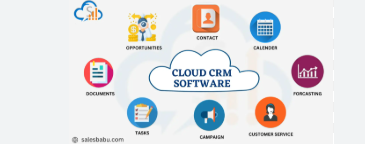In today’s digital-first world, customer relationships drive business growth more than ever. Whether you’re a startup scaling operations or an enterprise managing global accounts, Customer Relationship Management (CRM) software is essential. Cloud-based CRM platforms, in particular, have transformed how companies interact with customers, offering real-time accessibility, automation, and integration across teams.
But with dozens of options in the market, how do you decide which platform is the best fit for your business? In this article, we’ll explore the top CRM cloud platforms, highlighting their features, benefits, and what makes them stand out in 2025.
Why Choose a Cloud-Based CRM?
Cloud CRMs offer several advantages over traditional, on-premise systems:
- Accessibility: Work from anywhere with real-time updates.
- Scalability: Easily adjust as your business grows.
- Cost-Effectiveness: Reduce upfront hardware and maintenance costs.
- Integration: Connect with email, marketing automation, and analytics tools.
- Security: Benefit from enterprise-level data protection and compliance.
These benefits make cloud CRMs a must-have for businesses aiming to stay competitive.
Top CRM Cloud Platforms in 2025
1. Salesforce CRM
Salesforce remains the industry leader, holding the largest market share in CRM. Known for its robust customization and extensive app marketplace, it caters to businesses of all sizes.
Key Features:
- AI-powered insights with Einstein Analytics
- Scalable solutions for SMBs and enterprises
- Seamless integration with thousands of third-party apps
- Advanced reporting and forecasting tools
Best For: Businesses seeking a highly customizable CRM with global support and cutting-edge AI.
👉 Learn more about Salesforce CRM
2. HubSpot CRM
HubSpot CRM is popular among small and medium-sized businesses thanks to its free core features and user-friendly interface.
Key Features:
- Free plan with unlimited users
- Built-in marketing, sales, and service hubs
- Email tracking and automation tools
- Detailed customer journey analytics
Best For: Startups and SMBs looking for an all-in-one inbound marketing and CRM solution.
3. Microsoft Dynamics 365
Microsoft Dynamics 365 seamlessly integrates CRM with ERP, making it a powerhouse for organizations already using Microsoft products.
Key Features:
- Native integration with Office 365 and Teams
- AI-driven insights for sales and customer service
- Strong automation capabilities
- Customizable dashboards and workflows
Best For: Enterprises needing deep integration with Microsoft’s ecosystem.
4. Zoho CRM
Zoho CRM offers affordability without compromising on functionality, making it a favorite for growing businesses worldwide.
Key Features:
- AI assistant (Zia) for predictive analytics
- Multichannel communication (phone, email, live chat, and social media)
- Flexible pricing plans
- Workflow automation and performance tracking
Best For: SMBs looking for an affordable, feature-rich CRM.
5. Pipedrive
Pipedrive is designed with sales teams in mind, offering a visual pipeline to track and close deals faster.
Key Features:
- Drag-and-drop sales pipeline
- Automated reminders and follow-ups
- Email integration with tracking
- Customizable reporting
Best For: Sales-driven teams that need a simple yet powerful CRM focused on deal management.
6. Freshsales (by Freshworks)
Freshsales is gaining traction due to its affordability, ease of use, and AI-powered features.
Key Features:
- Built-in phone and email capabilities
- Freddy AI for lead scoring and insights
- 360-degree customer view
- Affordable pricing tiers
Best For: Small and medium-sized businesses wanting AI-powered CRM without high costs.
7. Monday Sales CRM
Monday.com has expanded beyond project management into CRM, offering a customizable and visual platform.
Key Features:
- Customizable workflows with drag-and-drop boards
- Automation of repetitive tasks
- Strong reporting and tracking features
- Integrates with Slack, Gmail, and Zoom
Best For: Businesses seeking a flexible, collaboration-first CRM.
How to Choose the Right CRM Cloud Platform
Selecting the best CRM depends on your specific needs. Consider the following:
- Business Size & Budget – Startups may benefit from HubSpot’s free plan, while enterprises may need Salesforce or Microsoft Dynamics.
- Industry Requirements – For B2B sales teams, Pipedrive may be ideal. For customer-centric service businesses, Zoho CRM fits better.
- Integration Needs – Companies heavily reliant on Microsoft should lean toward Dynamics 365.
- Ease of Use – Look for platforms with intuitive interfaces to ensure high adoption rates.
- Scalability – Ensure your CRM can grow with your business.

Conclusion
CRM cloud platforms have become indispensable for modern businesses. From Salesforce’s enterprise-grade capabilities to HubSpot’s beginner-friendly design and Zoho’s affordability, there’s a solution for every business size and need.
Investing in the right CRM means more than just managing customer data—it’s about building stronger relationships, driving sales growth, and enhancing customer experiences.
If you’re ready to take your business to the next level, start by evaluating your goals and testing out free trials. With the right CRM cloud platform, you’ll gain a competitive edge in 2025 and beyond.
✅ Internal Links (Examples):
✅ External Links:
